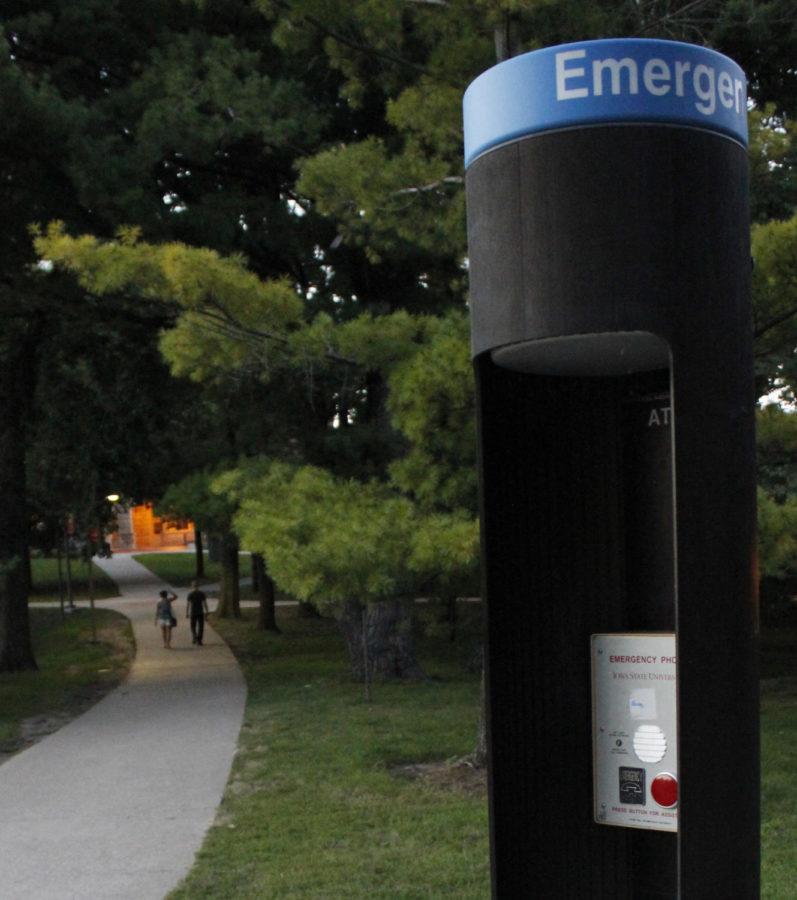CyRide, SafeRide, emergency posts, ISU Guardian: Iowa State’s safety programs
The Environmental Health and Safety building is located northwest of campus, with a mission to protect students and the environment at Iowa State through safety and preparedness. Emergency phones have been installed to give added protection to students, which can be found throughout campus.
January 23, 2019
The Iowa State Police Department will add a new app to the safety programs offered for Iowa State students.
Iowa State Police Chief Michael Newton told the Ames Tribune in December the new ISU Guardian app is expected to be available this spring. The app will provide several services to users, allowing students to share their location with a group of friends or family, providing one-touch access to law enforcement and offering an additional feature to allow individuals to report crimes anonymously.
The death of Celia Barquín Arozamena, a Spanish golfer and Iowa State student who was killed on a golf course near campus, has brought a lot of discussion in the Ames community and attention to safety around Iowa State and the safety services provided by the university. Existing safety services available to students, staff and Ames community members include blue emergency posts around campus, SafeRide and CyRide’s night routes.
Blue Emergency Posts on Campus
There are a blue emergency posts around campus with a button and a speaker. In emergency moments, these posts serve as a way to communicate with the Iowa State Police Department.
“In my 13 years working with the university police, there have only been a handful of times where someone has used an emergency post for an actual emergency,” said Jason Rieder, police lieutenant of ISU Police. The posts have been used more for smaller emergencies such as someone leaving their keys in their car.
Rieder said he believes people are less likely to need or use the emergency posts because of cellphones.
“Everyone nowadays goes straight to their smartphone, they don’t go looking for an emergency post when they are in trouble,” Rieder said.
SafeRide to University Locations
SafeRide is another service that contributes to campus safety at Iowa State. This service provides free ridership to students, staff and other persons who are going to or from university or sorority or fraternity properties. Also, if the person is walking and feels unsafe, SafeRide can provide a walking escort to their destination.
This service use to work during the hours of 9:30 p.m. until 5 a.m. These hours were recently changed because more people were in need of the service earlier in the day, especially in times when the weather changes and it begins to get dark earlier. SafeRide’s hours now go from 6 p.m. until 5:30 a.m. due to the high demand.
Rieder specified that SafeRide is a place that students, staff and people of the community can call at any time during their operating hours. However, many times it is difficult to get a ride because of how long the wait times are.
SafeRide only has two vehicles operating at a time, causing long wait times. Rieder said this causes a lot of students to cancel rides. The limited number of vehicles operating at a time is due to the lack of funding to have more on call or to pay more drivers.
After implementing the new SafeRide app in 2016, the demand for the service went up but the funding and budget did not. Rieder said that in the last year, there were 23,000 people who completed rides.
CyRide and the Moonlight Express
CyRide drivers consist mainly of students on campus. Bus ridership increases in January and February when the weather is colder and many students no longer walk or ride a bicycle, said Sheri Kyras, director of transit for CyRide. However, ridership has gone down within the past two years, which has affected the routes and overall demand for CyRide.
CyRide also provides the Moonlight Express system that provides late night routes Friday and Saturday from 10:30 p.m. until 3 a.m. the next day. This system provides a safe way for students to get home after a night out without having to walk or pay for a driving service. This service is only provided during specific hours for the safety of the drivers who are students themselves.
Kyras said there are not many weekend routes because funding and budgeting do not provide for it. Similar to SafeRide, Kyras said CyRide cannot provide more service due to funding that does not match the demand of riders. CyRide offers minimal routes on the weekend because classes are not in session, but students still expect to have a reliable system that can get them to practices, work and tutoring sessions.
Kyras said to make Osborn Drive feel safer the routes from West Ames to campus were changed to decrease the number of people not from campus. Kyras said it made some feel unsafe to have people other than students, faculty, staff and known guests on university grounds. This change in routes caused for many community riders to stop using the bus system.







